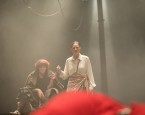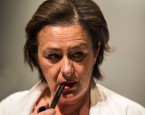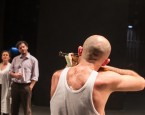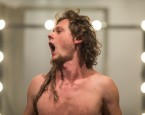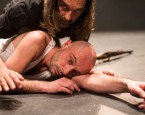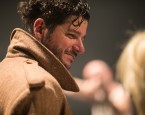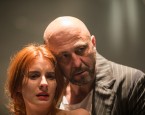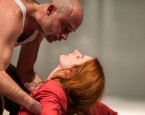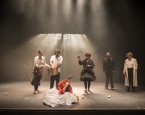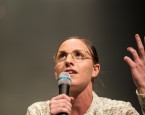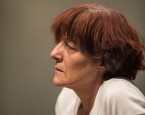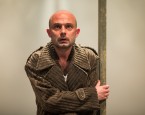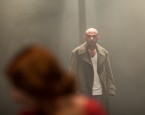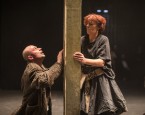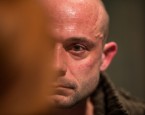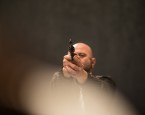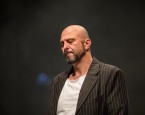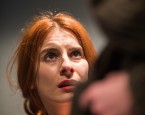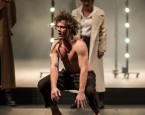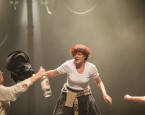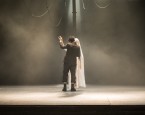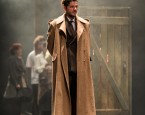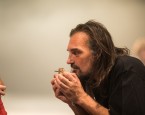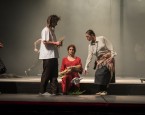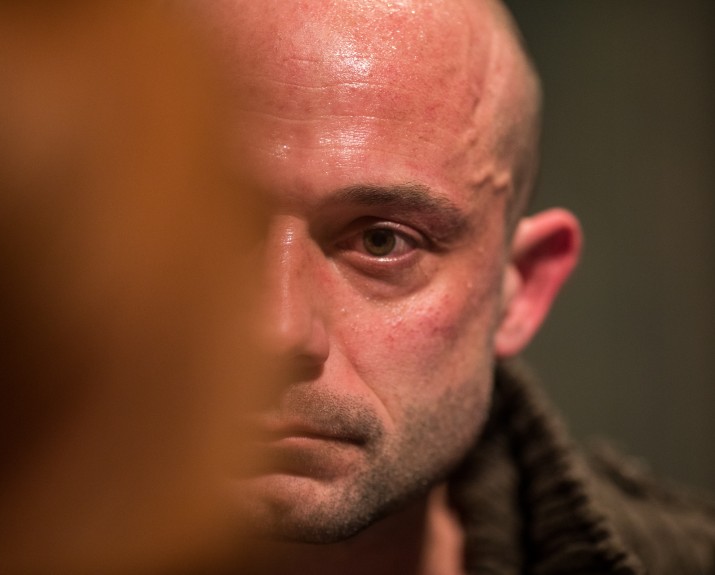
Premiere WOYZECKGeorg Büchner
Woyzeck is one of the most frequently performed and influential plays in German language that was never finished due to the early death of the young author. In its fragmented form it is an exceptionally powerful work on the dehumanisation of a man fighting to preserve his right to humanness. Franz Woyzeck is a recruited soldier, who, having to provide for his wife Marie and their child, explores ways to cope with poverty, injustice, loneliness and lack of understanding. For a small fee, he undergoes medical experiments, shaves his Captain or performs in a circus. This play is often regarded as the tragedy of working class as it deals with the so-called small man, who, trying to provide a better life for himself and his family, always encounters systemic barriers that eventually lead into destruction. Written in short, expressive cuts, Woyzeck leaves the impression of a vortex that irrevocably draws us, yet unmistakably giving the concrete image of the grinning system, the rules of which never fail to bypass us. Dean Krivačić will play the leading role of Franz Woyzeck in this Rijeka staging while the Belgrade actress Hana Selimović will be his partner in the role of Marie.
In co-operation of the Art-kino, the Croatian National Theatre Ivan pl. Zajc Rijeka and Goethe Institut Kroatien, the Art-kino is screeing Werner Herzog`s film Woyzeck (82 min) made in 1979, starring Klaus Kinski and Eva Mattes in leading roles, on Tuesday 16th January. After the screening you are invited to join the discussion entitled “Woyzeck in theatre and on film” with the authors of the theatre play Woyzeck.
Running time:
The performance lasts 1 hour.
The character of Woyzeck, as well as that of his author, Georg Büchner, are quite specific phenomena in the history of dramatic literature, phenomena entering the canon in order to change it irrevocably. However, it seems that a whole century was needed for the theatre to muster up enough courage to allow Georg Büchner to destroy the canon, also to allow his Woyzeck, the first anti-hero, as many theoreticians often call him, to say on stage quite openly, “This place is damned”. Namely, Woyzeck, created between 1835 and 1837, published posthumously in 1879, was performed for the first time only in Munich in 1913, as if it had been due to the dreadful threat of the World War I that the visionary quality of Büchner’s idea was recognised. Woyzeck has since become one of the most frequently performed and most influential dramatic works of the German peaking countries, while Büchner, who transformed a subject into a hero, has been recognised as a genius time and again. It is with him that the theatre started speaking openly of the true tragedies of modern times, for the first time bringing on stage the subject of misery, poverty and the darkest closets of the so called lower class, opposing them to the still darker minds that made wry faces from the above at this darkness, having ardently participated in its creation, enjoying their own monstrosity at the same time.
Büchner writes Woyzeck inspired by a true-life case of Johann Christian Woyzeck, who had become known to the public of that time due to the murder of his mistress, also the judicial entanglement regarding the trial and sentence execution. Büchner approaches this, both analytically and poetically, in a naturalistic and expressionist way, trying to reach the core of the context within which the murder occurs, the core of the world that resembles the grinning mask rather than a face, trying to detect all the society forces that created conditions for the execution of such a radical act, to raise one of the key issues of the drama, that of the relationship between the morality and money, namely, whether there are pre-conditions for us to be moral in a situation of existential threat? Thus, it is not surprising that it is this play that Siegfried Melchiner calls a masterpiece of political theatre, proclaiming Woyzeck an “infinitely contemporary” work, which, we could say, testifies of that vicious eternal coming back of the same that is impossible to resolve. It could be precisely this that makes it attractive. Written in short, expressive cuts, Woyzeck leaves the impression of a vortex that irrevocably draws us, yet unmistakably giving the concrete image of the grinning system, the rules of which never fail to bypass us, as all is always prepared for a disaster to happen. Impressive, expressive, distressingly tense, yet never finished due to the premature death of its author, Woyzeck becomes and remains an enigma of its own kind, open to new readings. Many interpreters of Büchner’s Woyzeck have polarised around the issue of the non-existent ending. Some believed that an ending would be of key importance for interpreting the play, while others claimed this to be of no importance for the interpretation. We will never know how would Büchner himself have ended his Woyzeck. He might have remained true to the documented source that he used, in which case Woyzeck would have been sentenced to public execution, or, he might have disregarded the real-life case and acquitted Woyzeck of his tragic guilt. However, there is also a third possibility, namely, even if he had stayed alive, Büchner might not have finished this play but would have left it open for us to write endings and look for ways in which to stop in time those who make us think that this place is damned.
Jelena Kovačić, Croatian drama director
Interview with the director ANICA TOMIĆ
Büchner influenced many authors of the 2oth and 21st century. Why is he so special and what is it that makes his work so influential? What is it that is frightening at all times and desperately real in Büchner’s Woyzeck?
I first read Woyzeck already as a nineteen-year old student of comparative literature. What struck me then and still does today is the directness and transparency of his sentence. He is a philosopher of language who does not hide behind possible meanders of discourse, but directs the replica directly to the reader, opening for her a field of thought that not only exposes deep structures of thoughts but also undermines the essence of what we believe in. There is no cowardice or treason in his thought. On the one hand, it is the speech of the deprived one, on the other, also the speech of the one who has power. Büchner is also fascinating because, in a way, he can also understand the characters that stand for unfair and amoral actions. There is no judgement in his thinking, it is a permanent act of observation that you, as a reader, also fight with and face as an interpreter. It is important to know that on the one side Büchner relies on the tradition of medieval moralities, which essentially teach the illiterate people enlightening them and instructing them in the fundamentals of good and evil, while on the other, in his typified characters, he partly also relies on commedia dell’arte, creating the so-called eternal and archetypal characters (such as Captain or Doctor, the latter in our adaptation having become a female Doctor), characters around which only epochs change, while in their principles and their viewpoints they are the same. Traditionally relying on that one archetypal world of characters, connecting them also with direct allusions on the Bible and introducing a spectrum of biblical “truths”, his universe becomes profound, unique and forever contemporary. In parallel with this, the anti-hero Woyzeck seems to be defying tragedy and in his tragic (no) guilt and tragic (no) knowledge he becomes a prototype of a hero for whom there is no salvation. Büchner is an absolute genius, though this is much more difficult to prove in literature then it would be, e.g., in physics.
It has been hard at times to put up with genius.
In his plays, the young Büchner uses documented facts. Is it of help to you to know that he wrote Woyzeck after a real-life story? Why, according to you, is Woyzeck considered to be the last tragedy in dramatic literature? Did Büchner say here “God is dead” even before Nietzsche?
When Nietzsche exclaims, “Where s God?” and answers, “(…) We have killed him, you and me! But, how did we do it?” he explains saying, “I’ll tell you. Haven’t we got lost as if in an infinite nothingness? Don’t we feel the breath of the empty universe? Isn’t the night continually swooping down on us? Don’t we hear anything but the sound of gravediggers who are burying God? Don’t we feel anything except for the divine decomposition? – Gods decompose, too! God is dead! (…)”.
Philosophically speaking, God dies every day for many people, this occurring relentlessly and at all times. God is the one who dies every day again, as human powerlessness consists in not being able to face its divine power. Human power stops where its powerlessness begins – powerlessness to be better than the human, powerlessness to acquire the “divine” in character – this being a human damnation. Büchner is interwoven with biblical quotations; he keeps calling on God as his accomplice in deed and misdeed. Thus, before going to commit murder, Woyzeck gives away a picture of a saint, also a beautiful piece of gold that was in his mother’s Bible, in which it says, “(…) Oh, Lord, make my heart red and bleed in every instant, as your body was (…)”. He is already committing the crime and looking for indulgence, if not the complicity of God. Deep-rooted in its basis, this is a pre-Catholic play, the one in which the character keeps calling on God that is not there, while he believes God is there – belief as an illusion of image and word.
How far did you go from the original, bearing in mind that it is the open dramaturgy that Woyzeck is famous for?
Woyzeck’s open dramaturgy is quite a slippery territory. It gives you freedom that requires you to be much more responsible, at the same time also much more closed. The way to a final text was long. We combined all translations as well as the scenes that were only emerging, bearing in mind that in the official version of the text some scenes were omitted. In the end, Büchner took to grave the answer as to what is the final dramaturgy of this work actually was. This Woyzeck is our answer to his secret, or our interpretation in which we approach each character hermeneutically, to open it by the reversed psychoanalysis, creating a now connotative meaning. It is here that the audience can find their meaning.
What was it like to work with Rijeka actors and collaborate with Hana Selimović?
I love and respect the Rijeka ensemble, having followed them for years. I was asked to come and direct here a few times, but had to decline the invitation for personal reasons. The moment I met the ensemble was like meting old friends in order to continue the conversation we had a long time ago.
I met Hana only once and very briefly. Interestingly, it was also in Rijeka. I was so fascinated by her energy, intelligence, sense of humour and a kind of female impertinence, that I knew she was our and my Marie in that Rijeka rainy night. She’s a wonderful person and actress.
Is your Woyzeck a soldier of a specific army?
There are no specific armies; there are only armies that are at the service of someone. Woyzeck is the one who serves someone, no matter who. It was on purpose that we didn’t put direct allusions in the play, as it is simply impossible to compete with the documentary aspect of the media and terrifying pictures that surround us on the daily basis. Our Woyzeck is created in the emotional clashes of the worlds of those who have the power over that of the deprived, the poor and forsaken ones. This is also the issue of social class, making us wonder whether a poor man can have morality. Namely, what is the relation between money and morality? Do we have to be able to afford morality?
A manipulated individual – what is his choice? Is there any battle that Woyzeck could win?
Woyzeck is a representative of the deprived mass, a frontman of the working class that has disappeared, class without any money, which has been made poor, asking whether a poor man can be moral. He loudly cries, “(…) of us, the poor, …as the one who has no money cannot take care of the morality in the world. But, the man is made of blood and flesh. None of us the poor is blessed in this or in that world. I think that even if we were to arrive to heaven, we would have to help with the thunderstone (…)”. This statement of class is not a question and no answer is sought, as there is no answer. A century later Brecht poses a question in the song,” Questions of a worker who reads”, asking, “Who built Thebes of the 7 gates? In the books you will read the names of kings.
Did the kings haul up the lumps of rock? … Every page a victory. Who cooked the feast for the victors? Every 10 years a great man. Who paid the bill? So many reports. So many questions. (…)”. Answers are clear, it is the others, the oppressed, the deprived; it was they who built, workers in one word. In contrast with all these questions and observations, one thing is certain, namely, if this were an ideal world functioning after the principle of moral values, we would be a tolerant, wonderful and blessed society, in the best sense of the word. Yet, there is no world of ours without Woyzeck, just as this world exists in order to produce Woyzecks.
Why is your Marie different?
She is not different, only interpreted from the perspective of two women (Jelena Kovačić, the dramaturge, and me) who ponder upon the world from woman’s eyes. Marie is first a mother, then a wife and finally a mistress, from a saint to a sinful woman, at least according to Büchner. This simplified and written down biblical misogyny against women surely does not refer to us and to our understanding of the female gender. The tragedy of Marie is not only her poverty, but lies in the fact that her life is positioned in the relation to the other (a man), where all the tragedy of the female gender begins, namely, in the consent to be conditioned by a man’s world. We are changing this perspective, yet, regardless of the change and the rebellion of Marie, she still ends under the knife; neither is there resurrection for her, so that here we connect with Büchner again.
Is there something on the stage for the actors to “hide” behind? Why is it necessary to have a bare stage design?
It is not necessary, but a decision taken. This space is bare, at the same time it is a vacuumed and stifling horror vacui, which you want to run away from. Its darkness is big and this is where its claustrophobia lies, as in this empty space, watching these people, you sometimes have a feeling that you cannot breathe, as they choke and deafen the space with their actions.
Where does the inspiration with folklore elements in the performance come from?
The inspiration comes primarily from Büchner and the folklore inscribed in him. All the songs that his characters sing are part of the German folklore; furthermore, Büchner is deeply immersed in it. Büchner’s heroes sing folk songs, those that are transmitted from generation to generation, and it is this, among other things, which underlies the archetypal quality of the text. Upon the first reading of the play I found it logical to introduce folklore into that world, as it gives the performance a ritual quality, paradoxically also the contemporaneity. Careful spectators might recognise the germs of what our country has turned into, a country of bumpkins colloquially speaking, which can both be ours or someone else’s; the universe thus becoming understandable to all, regardless of the ethnic or political affiliation.
If the play is dark, what is the light in it (except for Deni Šesnić’s)? Do we need light and hope or is facing the truth inevitable?
This question I leave to the readers of your booklet. Anyway, it is for you, dear readers, and spectators also, that we are making this staging. It is up to you to ask if there is hope, also to answer the same question. It is up to you to decide which part from this dark auditorium to take for yourself. We are producing theatre, among other things, to give legitimacy to a newly created reality that is every evening generated for you, in front of you, on the stage. If you become absorbed enough, it could become your future as well, of course, a more beautiful and better one.
He was born in Goddelau on 17th October 1813 and died in Zürich on 19th February 1837. Apart from being a forerunner of Expressionist school of playwriting, many consider him to be a socio-political as well as artistic revolutionary.
During his life Büchner wrote three plays, Danton’s Death (1835), Leonce and Lena (1836) and Woyzeck, created between 1835 and 1837 and left unfinished due to his death. Apart from these plays, he also left a short prose fiction work Lenz and the leaflet Der Hessische Landbote (The Hessian Messenger, 1834), in which he openly calls for economic and political revolution. As part of his political and social activities, he founded a radical society, the Society for Human Rights. He escaped arrest by fleeing to Strasbourg, where he completed his dissertation. This earned him an appointment as a lecturer in natural science at the University of Zürich, where he died in 1837 of typhoid fever.
Although he died young and wrote just a few plays, it is almost unbelievable to what extent Georg Büchner made impact on the change of paradigm within dramatic literature, due to which he exercised a marked influence on many authors of the twentieth century, including the whole set of German expressionists, as Bertolt Brecht, Gerhart Hauptmann, Frank Wedekind and many others.
Besides his aesthetic revolution, Büchner is quite dedicated to the consideration of social revolution. It was he who formulated the well-known phrase, “Peace to the huts! War on the palaces!” at the beginning of The Hessian Messenger, Büchner’s only political piece of writing, a revolutionary pamphlet on social inequalities, due to which he had to flee to Strasbourg, as he was persecuted by the authorities.
Georg Büchner is the first playwright to introduce characters from the working class, giving them the voice, face and narrative framework, thus making visible the lives that until that time could only peer out behind the theatre curtain. Lightning the “invisible”, Büchner pointed to completely new aesthetic issues and social answers that still today encounter disapproval and the unwillingness to deal with them.
Prepared by Nataša Antulov




